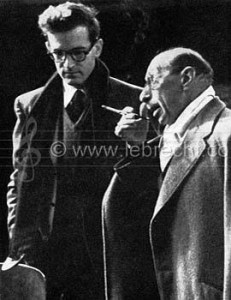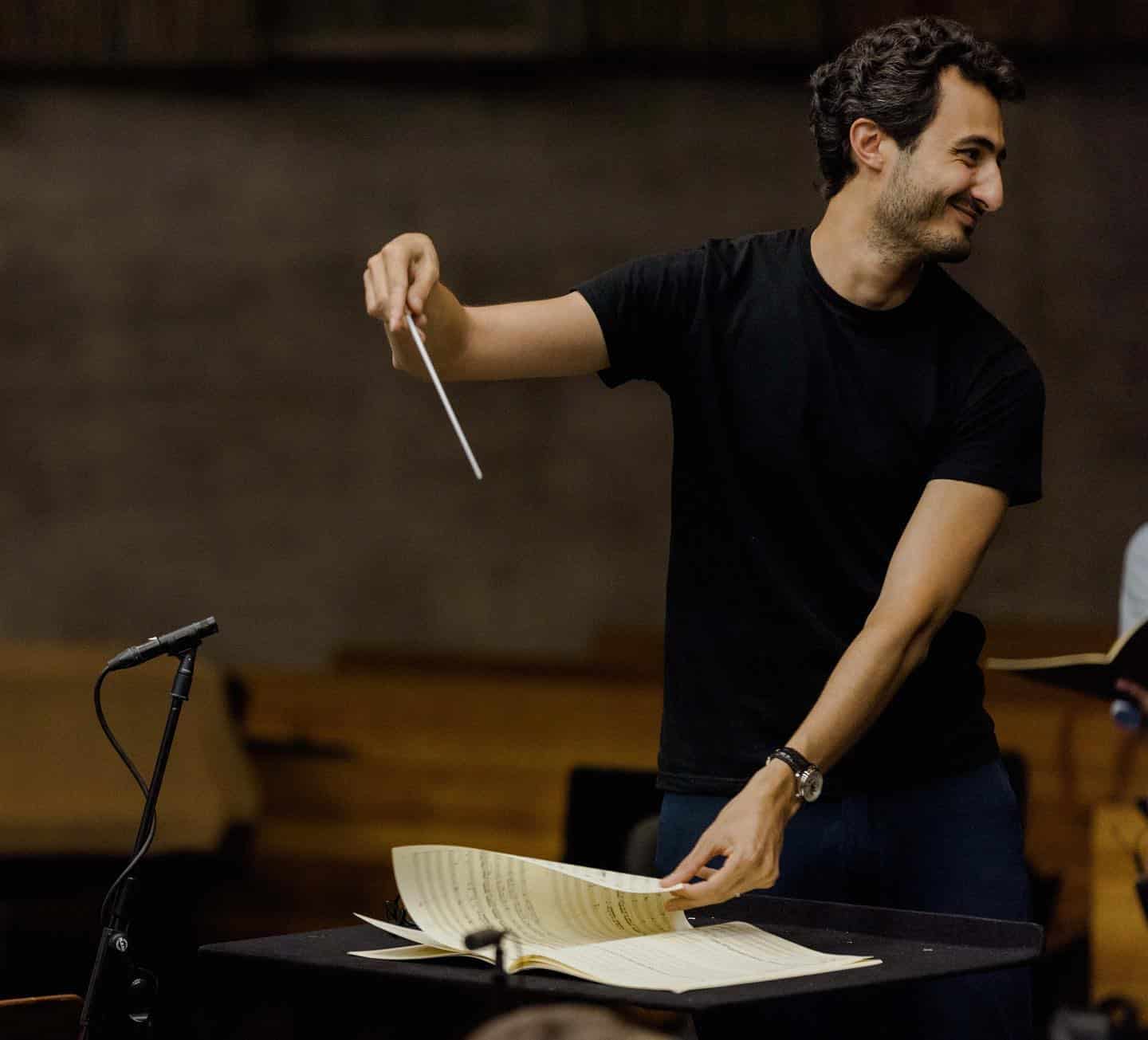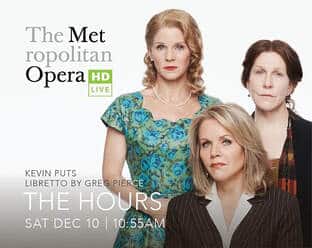Robert Craft: ‘Stravinsky never went to funerals…’
mainThe composer’s assistant, who died last week, recalls the dramatic events surrounding the great man’s obsequies in Venice, 44 years ago. Ezra Pound was there.
Craft will be buried at the same location.
Detailed and moving.







Ezra Pound gave anti-American and Pro-Fascist radio broadcasts in Italy throughout WWII. At war’s end he was arrested and evaded a death penalty for treason by spending ten years in an insane asylum whereupon he immediately returned to Italy. Upon seeing Italy’s shores he gave the fascist salute. Only late in life did he begin to hint that he erred in his judgments.
It is not well-known that Stravinsky was also a supporter of Mussolini. In 1930, Stravinsky said, “I don’t believe that anyone venerates Mussolini more than I … I know many exalted personages, and my artist’s mind does not shrink from political and social issues. Well, after having seen so many events and so many more or less representative men, I have an overpowering urge to render homage to your Duce. He is the saviour of Italy and – let us hope – Europe”.
After a private audience with Mussolini, he added, “Unless my ears deceive me, the voice of Rome is the voice of Il Duce. I told him that I felt like a fascist myself… In spite of being extremely busy, Mussolini did me the great honour of conversing with me for three-quarters of an hour. We talked about music, art and politics”.
Perhaps we see why Pound was at Stravinsky’s funeral.
Or maybe he just liked the man. The whole conversation about prominent people who liked Hitler or Mussolini (or whoever else) is really kind of tiresome by now.
Yes, we all know that Stravinsky was mentally retarded and had no understanding of what Mussolini stood for….
Mr. Osborne is correct. More information and quoted letters on Stravinsky’s support and opportunism vis-a-vis not only fascist Italy but Nazi Germany can be found in Harvey Sachs’ “Music in Fascist Italy.” Stravinsky was far more culpable than Richard Strauss. But Stravinsky wrote the “right” kind of music and Strauss did not.
Evaluations about who was more culpable are difficult to formulate. The circumstances were complex. Full knowledge of Nazi policies was not as clear as after the war, and our views even in hindsight are somewhat subjective. Stravinsky, for example, did nothing comparable to accepting the position of President of the Reichsmusikkammer – something endlessly rationalized in the case of Strauss.
Stravinsky’s curious sympathies backfired when the Nazis classified his work as “Entartete Musik.” He then went to lengths to dispel rumors he was a Jewish Bolshevist by providing Nazi authorities (the German Bureau of Foreign Affairs) with his genealogy to establish his Aryan and aristocratic origins. He not only testified to his abhorrence for the Soviet Union, but also his contempt for liberalism and democracy. His standing in Nazi Germany was then restored.
We forget that many artists before and during the war saw Fascism and Nazism not only as ripostes to Communism, but as concrete manifestations of the Futurists’ avant-garde philosophies which claimed that war, authoritarianism, racism, eugenics, and masculinism were progressive manifestations of European culture. Through Ezra Pound’s influence, even artists like James Joyce and William Butler Yeats were drawn to one degree or another toward Fascism. To this day, artists seem eager to join in the latest aesthetic trends and to identify themselves within collectives built around aesthetic philosophies. These orthodoxies are nowhere more apparent than in classical music, though perhaps fortunately they tend to be apolitical these days.
Modernism was the last real orthodoxy in music life, an ideology which is eroding fast nowadays. The central performance culture has no orthodoxy but just wants to achieve excellence in presenting concerts.
The crazy idea that there were something like ‘progress’ in music has mobilized lots of nonsense.
The strongest orthodoxy in contemporary classical music in the USA today is anti-modernism. Ironically, and though situated in an entirely different context, Hitler and Stalin also made anti-modernism an orthodoxy, even on pain of death.
In those years (twenties & thirties) Stravinsky had not only his own family to support, but also a number of other relations who had fled from the Russian revolution. He could not look further ahead, financially, than the next commission, which was always an insecure gamble. That is why he began playing and conducting his own works, in spite of not quite being up to the job. After the crash of 1929 also in music life money got sparse. It looks as if he simply did what he could to safeguard his career as much as possible, with so much insecurity, on top of his own identity insecurity as a refugee in France.
The poet Robert Frost sprung old Ezra from the asylum.
I think this is the photo referred to by Mr. Craft in the video. It is of Stravinsky feeding the cats in Venice – which he did every day – and which was hung all about Venice by the Mayor after Stravinsky died. http://bit.ly/1Oe1lf3
“The strongest orthodoxy in contemporary classical music in the USA today is anti-modernism. Ironically, and though situated in an entirely different context, Hitler and Stalin also made anti-modernism an orthodoxy, even on pain of death.” (Mr Osborne)
It is always puzzling to see the products of Mr O’s labyrinthine mind. What would he want to say with this remark? That the liberation from modernist ideology is an orthodoxy? If so, is freedom as such also an orthodoxy? Is “anti-modernism” in the USA a secret way of being totalitarian. a kind of fascism lurking under the surface of populist commercialism? And then, is dislike of modernism a sign of an orthodox mind, even in the context of freedom? I have seen this kind of “freedom” being imposed from above by modernist new music establishments, with the exclusion of anybody who dared to use this “freedom” to explore other paths than atonalism and its progeny. Webern was a fanatic advocate of nazism, even during the war, but was he representing modernist freedom from tradition? (That is how he was considered in the fiftes and sixties.) And then, in Russia: the state forced an accessible traditionalism upon composers, but does that mean that traditionalism is, in itself, totalitarian? It may be that Americans are easier with discarding theory and simply judge the effect of music, while in Europe every composer has a rucksack packed with philosophy and theory, as a listening manual to be digested before hearing the music, to be sure that prejudice has been installed before any freedom of assessment gets its chance.
It is puzzling to you because you have made a fetish out of modernism — a sort of voodoo doll in which you must regularly stick pins to insure the maintenance of your rather idiosyncratic worldview. As for the anti-modernist orthodoxy in the USA and its position in the musical establishment, I will simply point out that this was recently discussed on SD here:
https://slippedisc.com/2015/11/lang-and-beiser-win-50k-grants/
“….merging classical music with commercialized, market-oriented work” is, if meant to describe the type of ‘cross-over’ with pop and film music, a disgrace… indeed. But the fact that there are a lot of lovers of classical music out there who also form a ‘market’, does not mean that new music that is preferred by them, is for that reason THUS ‘commercialized, market-oriented work’. In other worlds, ‘market-oriented work’ is, in fact, rather meaningless as a concept because it says nothing about quality. If it were to define quality, among the worst pieces ever would be Beethoven V, the Mendelssohn violin concerto, Mozart Jupiter and the three da Ponte operas, etc. etc. Music can be very good and in the same time, financially successful because many people want to hear it. I would not call someone like Arvo Pärt ‘commercial’, although his music is very popular and probably earning a lot of money for everybody handling it, including the composer.
I don’t know in which far-away place Mr O is living, but modernist music is NOT very welcome in the central performance culture, where there is a very general awareness that it does not belong there and performances of that stuff merely happen out of a feeling of obligation – in short: it is merely tolerated. The unspoken but wide-spread indifference for new music in performance practice (and often: contempt), is caused by modernism’s claims to be music and to have a right within its performing world, instead of staying in modernism’s own small terrotory of specialism. Talking about ‘markets’: it has completely spoiled the ‘music market’. Anyone who has not noticed this, has had his head somewhere in a deep, quiet hole. So, openly saying what numerous people in the music world are thinking, only suppressed by politeness and political correctness, is the opposite of ‘voodoo’ and comparable notions, resulting from ignorance.
Have a nice day, thanks for a very interesting article. everyone chooses their own path. If you need funeral services or cremation crates, you can turn to reliable coffins. They will tell you how much the caskets cost, as well as tell you all the characteristics: weight, coffin sizes, how it was done. They have free shipping and good discounts. If you need something in this area, then you can contact them.